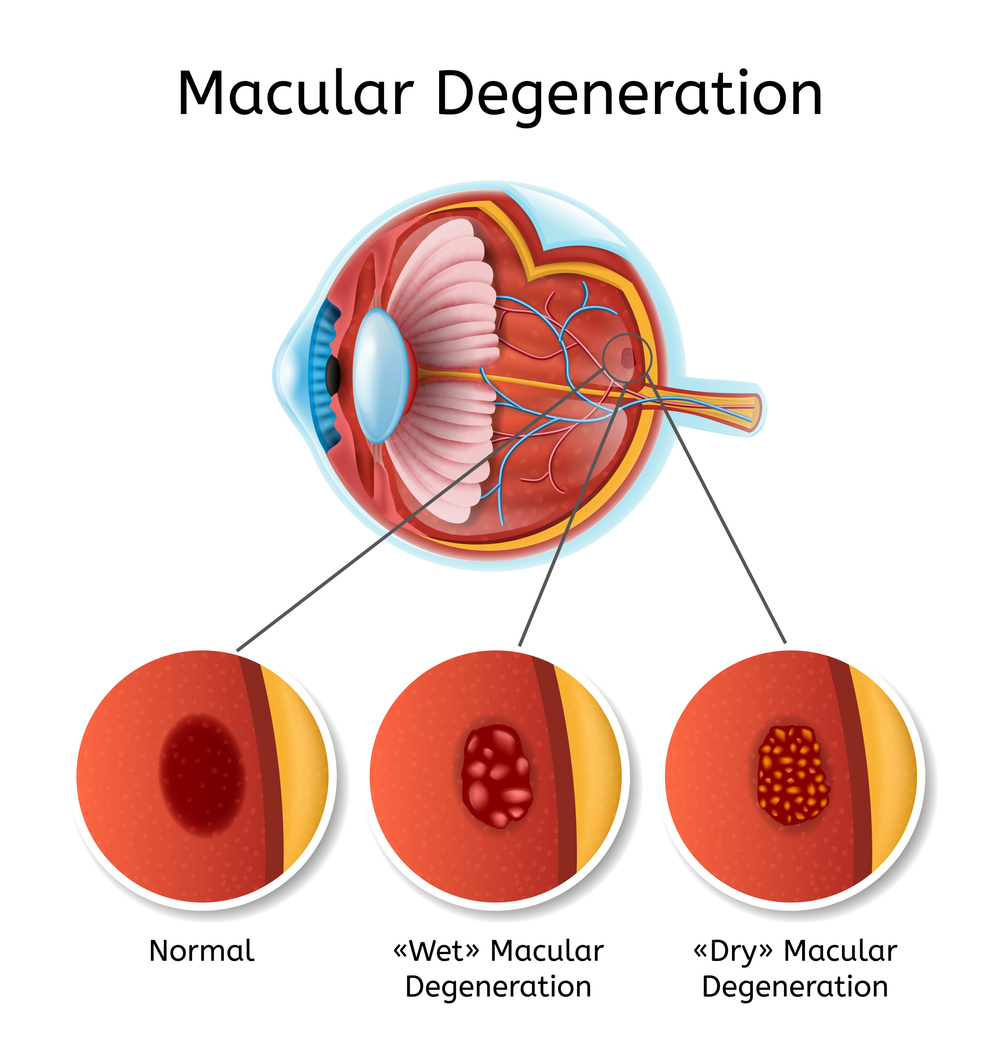About Macular Degeneration
Macular degeneration, also known as age-related macular degeneration (AMD), is a common eye condition that affects the central part of the retina, known as the macula. This condition gradually impairs central vision, making activities like reading and driving difficult. Macular degeneration is a leading cause of vision loss among older adults, affecting millions of people worldwide.
Understanding the symptoms, causes, diagnosis and treatment options for macular degeneration is crucial for effective management and preservation of vision.

Symptoms | Diagnosis | Causes | Diagnosis | Treatment | Outlook | FAQs
Symptoms of Macular Degeneration
Symptoms of macular degeneration may vary depending on the stage and severity of the condition. Early signs include blurred or distorted central vision, difficulty reading or recognizing faces, and the appearance of dark spots in the central vision. As the condition progresses, central vision loss may worsen, leading to a significant impact on daily activities.
Causes of Macular Degeneration
The exact cause of macular degeneration is not fully understood, but several factors contribute to its development. These factors include aging, genetics, smoking, obesity and exposure to ultraviolet light. Damage to the macula over time leads to the characteristic vision loss associated with macular degeneration.
Diagnosis of Macular Degeneration
Diagnosis of macular degeneration typically involves a comprehensive eye examination, including visual acuity tests, dilated eye exams, and imaging tests such as optical coherence tomography (OCT) and fluorescein angiography. Early detection and regular eye examinations are essential for diagnosing macular degeneration and initiating timely treatment.
Treatment for Macular Degeneration
While there is no cure for macular degeneration, several treatment options are available to slow its progression and manage symptoms. These may include lifestyle modifications such as quitting smoking, maintaining a healthy diet rich in antioxidants and omega-3 fatty acids, and wearing sunglasses to protect against ultraviolet light. In some cases, medications such as anti-VEGF injections or photodynamic therapy may be recommended to reduce abnormal blood vessel growth and leakage in the retina.
Outlook for Those with Macular Degeneration
The outlook for individuals with macular degeneration varies depending on the stage and severity of the condition, as well as individual factors such as age and overall health. While macular degeneration can lead to significant vision loss, early detection, lifestyle modifications and timely treatment can help slow its progression and preserve vision for as long as possible.
Summary
Macular degeneration is a common eye condition that affects the central part of the retina, leading to gradual central vision loss. While there is no cure for macular degeneration, early detection, lifestyle modifications and appropriate treatment can help slow its progression and preserve vision. Regular eye examinations are essential for diagnosing macular degeneration and initiating timely intervention to optimize visual outcomes. Understanding the symptoms, causes, diagnosis, treatment options and outlook for macular degeneration is essential for individuals affected by this condition and their caregivers.
FAQs
Can you stop macular degeneration from progressing?
While there is no cure for macular degeneration, several measures can help slow down its progression. These include lifestyle modifications such as quitting smoking, maintaining a healthy diet rich in antioxidants and omega-3 fatty acids, wearing sunglasses to protect against ultraviolet light, and adhering to regular eye examinations. Early detection and intervention are crucial for managing macular degeneration effectively.
How long before macular degeneration causes blindness?
The progression of macular degeneration varies among individuals. In some cases, it may progress slowly over many years without leading to blindness. However, in more advanced cases, macular degeneration can result in significant vision loss and legal blindness if left untreated. Regular eye examinations can help monitor the progression of the disease and intervene as needed to preserve vision.
Can anything be done for macular degeneration?
Yes, several treatment options are available for macular degeneration, depending on the type and severity of the condition. This may include lifestyle modifications, dietary supplements, medications such as anti-VEGF injections, photodynamic therapy or low-vision rehabilitation services. These interventions can slow down the progression of the disease and manage symptoms effectively.
What makes macular degeneration worse?
Several factors are associated with macular degeneration, including smoking, obesity, high blood pressure, high cholesterol and prolonged exposure to ultraviolet light. It’s essential to address these risk factors and adopt a healthy lifestyle to help slow the progression of the disease. Regular eye examinations and personalized care at Benaim Eye & Aesthetics can help identify and manage these risk factors effectively.
Can laser eye surgery fix macular degeneration?
Laser eye surgery is not typically used to treat macular degeneration. While it may be effective for certain eye conditions, it is not a recommended treatment for macular degeneration. However, individuals with macular degeneration may benefit from other treatment options available at Benaim Eye & Aesthetics, such as anti-VEGF injections or photodynamic therapy, which can halt the progression of the disease and manage symptoms effectively.
What is the best drink for macular degeneration?
Green tea is often cited as a beneficial drink for eye health, including macular degeneration. It contains antioxidants called catechins, which may help protect the eyes from damage caused by free radicals. Including green tea as part of a healthy diet, along with regular eye examinations and personalized care, can help support overall eye health and manage macular degeneration effectively.
What are the 4 stages of macular degeneration?
The four stages of macular degeneration are:
- Early AMD (Age-related Macular Degeneration)
- Intermediate AMD
- Late AMD (Dry AMD or Wet AMD)
- Advanced AMD with vision loss
Each stage represents a progression of the disease, with advanced stages leading to significant vision loss if left untreated. Regular eye examinations at Benaim Eye & Aesthetics can help detect and monitor the progression of macular degeneration, allowing for timely intervention and management to preserve vision.
What is the life expectancy of macular degeneration?
Macular degeneration itself does not typically affect life expectancy. However, individuals with advanced stages of the disease may experience a decline in vision, impacting their quality of life. Early detection and intervention, along with personalized care at Benaim Eye & Aesthetics, can help slow the progression of the disease and preserve vision for as long as possible.
What is the average age for macular degeneration?
Macular degeneration most commonly affects individuals over the age of 50, with the risk increasing with age. However, it can occur earlier in some cases, particularly in individuals with a family history of the disease or other risk factors.
What is the red flag for macular degeneration?
A red flag for macular degeneration includes symptoms such as blurred or distorted central vision, dark spots or shadows in the central vision, and difficulty recognizing faces or reading. If you experience any of these symptoms, it’s essential to seek prompt evaluation and treatment from the experts at Benaim Eye & Aesthetics to preserve vision and prevent further progression of the disease.
Are bananas good for macular degeneration?
Bananas are a source of important nutrients such as vitamin C, potassium and fiber, which are beneficial for overall health. While they may not directly impact macular degeneration, including a variety of fruits and vegetables in the diet can support overall well-being and eye health.
What foods should you avoid with macular degeneration?
Individuals with macular degeneration should limit or avoid foods high in saturated fats, sugars and processed ingredients. Additionally, reducing alcohol consumption and avoiding smoking can help protect against macular degeneration and preserve vision.
What not to do if you have macular degeneration?
If you have macular degeneration, it’s essential to avoid smoking, limit alcohol consumption, maintain a healthy weight and protect your eyes from prolonged exposure to ultraviolet light. Regular eye examinations and personalized care at Benaim Eye & Aesthetics can help monitor the progression of the disease and intervene as needed to preserve vision and quality of life.
Do you completely lose your sight with macular degeneration?
While macular degeneration can lead to significant vision loss, it does not typically result in complete blindness. Peripheral vision is usually preserved, allowing individuals to maintain some level of functional vision. However, timely intervention and management are essential to slow down the progression of the disease and preserve vision for as long as possible.
What speeds up macular degeneration?
Factors that can speed up the progression of macular degeneration include smoking, obesity, high blood pressure, high cholesterol and prolonged exposure to ultraviolet light. It’s essential to address these risk factors and adopt a healthy lifestyle to help slow down the progression of the disease. Regular eye examinations and personalized care at Benaim Eye & Aesthetics can help identify and manage these risk factors effectively.
Does cataract surgery fix macular degeneration?
Cataract surgery can improve vision in individuals with both cataracts and macular degeneration. However, it does not directly treat macular degeneration or reverse its progression. It’s essential to consult with the experts at Benaim Eye & Aesthetics to discuss treatment options tailored to your specific needs and circumstances.
Does macular eye surgery hurt?
Macular eye surgery is typically performed under anesthesia, so patients may experience some discomfort during the procedure. However, anesthesia and pain management techniques are used to minimize discomfort and ensure a comfortable experience. The experts at Benaim Eye & Aesthetics will guide you through the process and address any concerns you may have about macular eye surgery.
Does coffee help macular degeneration?
Some studies suggest that moderate coffee consumption may be associated with a reduced risk of developing macular degeneration. However, more research is needed to fully understand the relationship between coffee and eye health.
Which fruit is good for the eyes?
Fruits such as berries, oranges and kiwi are rich in antioxidants and vitamins that are beneficial for eye health, including macular degeneration. Adding a variety of fruits to your diet can help support overall eye health and reduce the risk of developing eye conditions.
Can you eat butter with macular degeneration?
While butter is high in saturated fat, which should be consumed in moderation, it can be included as part of a balanced diet for individuals with macular degeneration. However, it’s essential to prioritize healthy fats from sources such as olive oil, avocados and nuts.
What are signs that macular degeneration is progressing?
Signs that macular degeneration is progressing may include worsening central vision loss, increased distortion or blurriness in vision and the appearance of new dark spots or shadows in the central vision. If you experience any of these symptoms, it’s essential to seek prompt evaluation and treatment from the experts at Benaim Eye & Aesthetics to preserve vision and prevent further progression of the disease.
What percentage of wet macular degeneration patients go blind?
Wet macular degeneration is a more advanced and severe form of the disease. Without timely treatment, it can lead to significant vision loss and legal blindness. However, with appropriate treatment and management, the progression of wet macular degeneration can be slowed,
preserving vision for as long as possible. Early detection and intervention at Benaim Eye & Aesthetics are crucial for achieving optimal outcomes and preserving vision.
Can you live normally with macular degeneration?
While macular degeneration can lead to significant vision loss and impact daily activities, many individuals can live fulfilling lives with appropriate management and support. This may include vision aids, low-vision rehabilitation services and lifestyle modifications to optimize remaining vision and maintain independence. The experts at Benaim Eye & Aesthetics are dedicated to providing comprehensive care and support for individuals with macular degeneration, helping them achieve the best possible quality of life.
 New Address:
New Address: